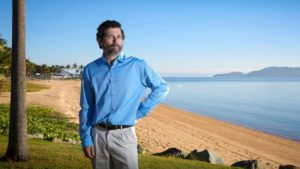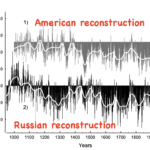
Peter Ridd.
Het afsterven van koralen, in het bijzonder van het Australische ‘ Great Barrier Reef’ is een vast onderdeel van de litanie van klimaatangsten. De Australische natuurkundige Peter Ridd had de euvele moed om te beweren dat het allemaal wel meeviel en dat de methoden en uitkomsten van het onderzoek van zijn collega’s naar de staat van het rif nogal wat gebreken vertoonden. De Australische James Cook Universiteit, waaraan hij is verbonden, was niet blij met zijn kritiek en verweet hem oncollegiaal gedrag. De Universiteit verbood hem daarover verdere uitspraken te doen. Peter Ridd achtte zulks in strijd met de academische vrijheid en wetenschappelijk integriteit. Hij besloot de zaak aanhangig te maken bij het ‘Federal Court’.
In zijn eerdere bijdrage, ‘Klimaatverandering: invloed van CO2’, behandelde Dick Thoenes enige hoogtepunten uit het boek ‘Climate Change: The Facts 2017’, uitgegeven door het ‘Institute of Public Affairs’, Melbourne 2017.
Over koraalriffen schreef hij:
Er bestaat ook een idee dat meer CO2 in de atmosfeer zou leiden tot verzuring van de oceanen en aantasting van de koraalriffen. Hierover is veel onderzoek gedaan, vooral door Australiërs. Dat is niet te verwonderen want het grootste koraalrif in de wereld is het Great Barrier Reef, dat direct ten oosten van Australië ligt. In hoofdstuk 1 wordt door Peter Ridd uitgebreid verslag gedaan van langdurig onderzoek aan dit beroemde koraalrif. Zijn conclusie is duidelijk: er is niets met het rif aan de hand.
John Abbot en Jennifer Marohasy berichten over mogelijke verzuring van de oceanen. Ook alarmistische berichten hierover berusten geheel op fantasie. Het oceaanwater is zwak alkalisch en bovendien gebufferd. Er komen steeds kleine pH-variaties voor, vooral binnen een etmaal. De verschillen in zuurgraad die tussen dag en nacht optreden (pH tussen 8,1 en 8,4 in de zomer en tussen 7,9 en 8,2 in de winter) zijn groter dan die door de vermeende “verzuring” (pH daling van 0,1 of 0,2 eenheden).
Aldus Dick Thoenes.
Voor de opvattingen van Peter Ridd zie hier (vanaf 23.00)
Zijn opvattingen hebben Peter Ridd dus in grote moeilijkheden gebracht met de Universiteit waaraan hij is verbonden, de James Cook Universiteit. Hij heeft een oproep gedaan voor ‘crowd funding’ voor de kosten voor juridische bijstand. Zijn oproep voor donaties hier te vinden.
Ridd’s verklaring:
In an era of dangerous group think in science academic freedom and scientic integrity is increasingly under attack. My name is Peter Ridd and I am a professor of physics at James Cook University. I am facing serioues repurcussions for supporting quality assurance in science. I am fighting James Cook University in the Federal Court to protect my academic freedom to discuss integrity in science. But I need your help to support my mounting legal costs.
Verdere informatie is hier te vinden.
De ‘crowd funding’ actie heeft binnen twee dagen maar liefst $95.000 (!!!) opgebracht. De commentaren zijn hartverwarmend!
Onder de titel, ‘Marine scientist Peter Ridd has refused to accept a formal censure and gag order from James Cook University and expanded his Federal Court action to defend academic freedoms and free speech’, schreef Graham Lloyd, in ‘The Australian’:
A revised statement of claim alleges JCU trawled through private email conversations in a bid to bolster its misconduct case against him.
JCU had found Professor Ridd guilty of “serious misconduct”, including denigrating a co-worker, denigrating the university, breaching confidentiality, publishing information outside of the university and disregarding his obligations as an employee.
Professor Ridd has asked the Federal Court to overturn the university ruling and confirm his right not to be silenced.
In the revised statement of claim, Professor Ridd has dropped an earlier claim of conflict of interest against JCU vice-chancellor Sandra Harding, but has alleged other senior staff had been biased and had not acted fairly or in good faith.
Professor Ridd’s Federal Court action is seen as a test of academic freedom and free speech, and has been supported by the Institute of Public Affairs.
Professor Ridd said he would seek public donations to continue the fight against JCU. He first took court action in November in a bid to stop a JCU disciplinary process against him for comments he made to Sky News presenter Alan Jones.
The university said by expressing concerns about the quality of some reef science, Professor Ridd had not acted in a “collegiate” manner.
Professor Ridd told Sky News: “The basic problem is that we can no longer trust the scientific organisations like the Australian Institute of Marine Science, even things like the ARC Centre of Excellence for Coral Reef Studies.”
He said a lot of the science was not properly checked, tested or replicated and “this is a great shame because we really need to be able to trust our scientific institutions and the fact is I do not think we can any more”.
A JCU spokesman said the university’s lawyers had invited Professor Ridd to discontinue his proceedings. “(He) has amended his proceedings. His decision to do so is a matter for him,” he said.
“The university intends to vigorously defend those proceedings (but) as these matters are before the courts, JCU will not comment further.”
Lawyers for JCU wrote to Professor Ridd on November 28 confirming the university had determined he had engaged in “serious misconduct” and issued him with a “final censure”.
“The disciplinary process and all information gathered and recorded in relation to the disciplinary process (including the allegations, letters, your client’s responses and the outcome of the disciplinary process) is confidential pursuant to clause 54.1.5 of the university enterprise agreement,” the JCU lawyers said.
Professor Ridd has subsequently published his concerns about the quality of reef science in a peer-reviewed journal. He said he was determined to speak freely about his treatment “even though it will go against explicit directions by JCU not to”.
“This is as much a case about free speech as it is about quality of science,” he said.
Ik heb het vaak eerder geschreven:
Klimaat maakt meer kapot dan je lief is.






Academische vrijheid, onafhankelijke wetenschap, bureaucratisch politiek ongestuurd / ambtelijk ongebonden onderzoek, kritische uitkomsten op overheidsbeleid en academische dogma’s.
Is dat nog mogelijk in Nederland (?),waar de politieke en ambtelijke volstrekt groen en “duurzaam” dominant zijn in de meningsvorming en gesubsidieerde alarmistische propaganda over klimaat, energie, milieu en natuur?
Peter Ridd zegt in het tweede linkje:
Scientists are trying to close down, or affect adversely the sugar cane, the cattle, and the coal industry, and they are also telling the world the reef is dead which affects the tourist industry in Queensland.
Like a bushfire… It [bleaching] looks terrible when it happens but it grows back.
Het lijkt of hij voornamelijk bezorgd is om het wegvallen van de toeristen bezoeken. Zo wordt hij een vertegenwoordiger van de toeristenindustrie i.p.v. een wetenschapper die zich zorgen maakt om de biodiversiteit. Hij is ook geen bioloog, maar een natuurkundige. Die denken vaak van allerlei markten thuis te zijn, net als Freeman Dyson.
Waar kunnen we dat peer-reviewed artikel van Ridd lezen? De twee linkjes onderaan dit artikel leiden niet naar dat wetenschappelijke artikel.
Leen, snap je de gevolgtrekking van de duidelijke constateringen van John Abbot en Jennifer Marohasy over het Great Barrier Reef niet ?
“De verschillen in zuurgraad die tussen dag en nacht optreden (pH tussen 8,1 en 8,4 in de zomer en tussen 7,9 en 8,2 in de winter) zijn groter dan die door de vermeende “verzuring” (pH daling van 0,1 of 0,2 eenheden).”
Dat is een interessant gegeven, maar daarmee sluit je niet uit dat de koralen niet tegen een pH onder de 7,9 kunnen, of dat ze soms juist een pH van 8,4 nodig hebben om te kunnen groeien. In de ecologie zijn vaak juist de extremen bepalend voor het voortbestaan.
Het effect kan ook indirect zijn wanneer evenwichten met andere soorten komen te verschuiven.
Maar los daarvan zou het me niet verbazen als in het Great Barrier Reef vervuiling of vertroebeling een grotere rol speelt dan de zuurgraad.
Urine van toeristen en onderzoekers is dodelijk voor koraal
haha, zeker als het azijnpissers zijn. :-)
Marleen,
Zie voor kwalificaties en publicaties Peter Ridd:
https://research.jcu.edu.au/portfolio/peter.ridd/
Hans Labohm, ja ik zie dat hij geofysicus is en een aantal publicaties heeft voornamelijk over ‘dredging’ ofwel baggeren. Hartelijk dank.
Het is volgens mij overigens eerder de temperatuurverhoging dan de verzuring van de oceanen die zorgen voor de verbleking van de koralen.
Marleen,
Een van de argumenten die Ridd aanvoert is dat koralen in wateren elders, die hogere temperaturen kennen, het goed doen.
In het verre verleden zijn de koralen ook aan behoorlijke temperatuurschommelingen blootgesteld. Ze zijn er nog steeds.
@Marleen Het is een combinatie van dalende zeespiegel ==> ondieper water ==> sterkere opwarming van het zeewater ==> bestaande algen sterven af (bleken) ==> aantreden nieuwe algen met een andere tolerantie van warm water.
http://landscapesandcycles.net/falling-sea-level–bleached-great-barrier-reef.html
Wat fijn zou het toch zijn om in een maatschappij te toeven waarin je niet de godganse dag wordt bang gemaakt met halfbakken alarmisme van ideologische signatuur!
Hans Labohm en Hetzler, ik zie dat geen van beiden de moeite heeft genomen onder de link van mijn naam te kijken en te lezen dat ik dat zelf in 2010 al meldde (zie laatste paragraaf).
Het is dus geen alarmisme wat hier aan de hand is, maar zorgvuldigheid en bezorgdheid. In een ding heeft Ridd gelijk en dat is dat zodra wetenschappers begrijpen hoe het met de natuur zit zoals met de koralen en de zooxantellen, dat er bezorgdheid ontstaat over het wel en wee van deze diertjes, die een zo belangrijk deel van de biodiversiteit vormen en herbergen. Maar dat is een logisch gevolg van de wetenschap dat de mens invloed uitoefent op het klimaat.
Marleen, als specialist ben je natuurlijk ook ervan op de hoogte dat Jacques Cousteau coral bleaching reeds vermeldde rond 1974 toen de wereld in het teken stond van de nieuwe ijstijd, lang voor global warming.
scitechdaily.com/jacques-cousteau-predicted-detrimental-change-in-coral-reefs/
Het verdwijnen (overbevissing) van met name de papagaai- of trekkersvissen(?) is ook genoemd als probleem voor de koraalriffen. Maar dat wist je al; misschien de andere lezers niet.
blog.nationalgeographic.org/2014/07/02/to-save-coral-reefs-start-with-parrotfish/
Dan nog is er het probleem van het toerisme en de (dodelijk giftige) zonnebrandolie die ze met zich meebrengen. time.com/4080985/sunscreen-coral-reefs/
Overigens kan infra-rood van meer broeikas effect water helemaal niet opwarmen. Alleen de zon kan dat, en de laatste 15-20 jaren waren er minder wolken.
Hoeveel zouden de koralen er dus bij gebaat zijn als we onze SUV’s voorgoed aan de kant zetten?
André Bijkerk,
Ik ben geen specialist van koralen hoor.
Van de berichten van Cousteau uit die tijd was ik niet op de hoogte.
Van het verdwijnen van de papegaaivis met desastreuze gevolgen voor de koralen wist ik. In die gevallen gaat het om het verstoren van ecosystemen als gevolg van overbevissing dat op haar beurt de algen doet groeien (niet de symbiotische algen uiteraard) die de koralen verstikken.
Van de zonnecrème had ik wel eens gehoord, maar het is mooi te vernemen dat je je zo bewust bent van de problemen voor de koralen. Onder Obama zijn er verschillende gebieden in de oceaan als beschermd verklaard. Trump heeft dat alles meteen teniet gedaan. Hij denkt kennelijk ook dat de mens geen invloed kan hebben op het wel een wee van de planeet.
Blijf maar gerust in die SUV rijden, straks zijn alle auto’s elektrisch en hoeven we daar niet meer over na te denken.
Ik lees uit het citaat iets heel anders: een kortdurend fenomeen van koraalbleking wordt afgeschilderd als het einde van het rif dat breed uitgemeten wordt in de media. Terwijl objectieve metingen aantonen dat dit niet het geval is.
Hier wordt dus een model weer eens belangrijker geacht dan waarnemingen, een bekend terugkerend verschijnsel bij alarmisten.
En ik lees het dat de bleeking steeds erger wordt (en dat is natuurlijk ook het resultaat van wetenschappelijk onderzoek op dat gebied)
En het verspreiden van opinie als feit is natuurlijk een bekend terug kerend verschijnsel bij de “sceptici”
Het feit dat koralen al 400 miljoen jaar bestaan en voor hetere vuren hebben gestaan is blijkbaar geen leerpunt bij de alarmistische ecologen. Overigens stond het great barrier reef tijdens de laatste ijstijd droog.
https://m.youtube.com/watch?v=KuStsFW4EmQ
Marleen, en hier zijn paper https://platogbr.files.wordpress.com/2017/12/larcombe-and-ridd-2018.pdf
Ja ja Viewpoint staat er nog boven, dus meer opinie dan wetenschap
Je begrijpt het niet, JvdH. De issue is niet of Peter Ridd al dan niet gelijk heeft. De issue is of hem – n.a.v. zijn uitgebreide en onderbouwde ‘viewpoint’ – het spreekrecht wordt ontnomen.
Bert Amesz, dank voor het artikel van Larcombe en Ridd.
Ik dacht dat het eerder de stijging van de temperatuur was dan de verzuring van de oceanen waardoor koralen verbleken.
Ik zie nu dat Ridd een geofysicus is, dat is inderdaad wat anders dan een fysicus. Over het artikel van Larcombe en Ridd, behalve dat het enige dat deze auteurs schrijven is dat het wel meevalt. Ik zou zeggen lees onderstaande link en beoordeel het zelf.
Uit de video valt op te maken dat Ridd de wetenschappers beschouwt als ‘a bunch of people pouring data’ iets wat hij zegt over peer review. Nu lijkt het net of hij niet weet wat peer review is, maar dat zal toch niet?
Als Ridd er niet tegen kan al deze gegevens te verstouwen dan kan hij wellicht de digests lezen als deze recente van het Nature artikel van Hughes et al. 2017
https://phys.org/news/2017-03-global-coral-great-barrier-reef.html
Het is niet verbazend dat de universiteit hem weert, hij beschouwt de wetenschappers als diegenen die zodra ze iets bestuderen er ook meteen iets aan de hand is met hun studie onderwerp (gelach uit de zaal, ik begrijp het lachen niet). Hij doet erg schamper over wetenschappers en dat is inderdaad niet netjes want het zijn tenslotte zijn collega’s.
Het is eigenlijk niet de moeite waard om aan een dergelijk onaangenaam persoon tijd te besteden.
Marleen, heb je ook nog inhoudelijke argumenten, behalve dat fysici denken van alle markten thuis te zijn?
Chemical,
Tja, goede vraag. Bovendien is Peter Ridd niet zo maar een natuurkundige.
Peter Ridd is a geophysicist with the following interests: coastal oceanography, the effects of sediments on coral reefs, instrument development, geophysical sensing of the earth, past and future climates, atmospheric modelling. In addition with his group in the Marine Geophysics Laboratory (http://www.marinegeophysics.com.au/) he works on the development of instruments including: sediment deposition sensors, light sensors, tilt current meters, and Lagrangian drifters. He also works on applications to agriculture and weed control including an automated weed killing robot and non-invasively sensing defects in fruit.
Chemical,
Het is natuurlijk niet zo handig van Ridd een verblekend koraalrif te vergelijken met bosbranden, net nu in Californië, maar ook in Italie en Spanje afgelopen zomer enorm veel bossen, plus hun fauna naar de knoppen zijn gegaan. Dan kun je wel zeggen dat we (of ze: de bossen en de koralen) zichzelf weer herstellen, maar ondertussen ontbreekt dat stuk natuur waar we allemaal zo van genieten wel. Wat dacht je er van als de hele Veluwe zou afbranden? Niet zo leuk toch?
Marleen het is ook niet aardig van jou om á priori de ethische motieven van een kritische wetenschapper in twijfel te trekken.
De hele Veluwe zal uiteindelijk toch afbranden, maar dan als biomassa.
Marleen, als “een onaangenaam persoon zijn” voldoende rechtvaardiging is om een wetenschapper de mond te snoeren, wordt het wel heel stil aan de universiteiten.
Intellectuelen liggen aan een chronische geld transfusie waardoor innovatie onmogelijk is !
Het feit dat de temperatuur verandering ngekend snel is maakt dat het nu wel wat anders is dan de afgelopen 400 miljoen jaar. Verder `heeft het koraal ook nog wat last van andere activiteiten zoals toerisme, visserij, baggeractiviteiten, run of van akkerbouw en veeteelt
Maar goed …..
En van biologen ;-)
Koraal kan gemiddeld tot wel 10cm per jaar meegroeien met zeeniveaustijging, de zeespiegel die maar niet catastrofaal wil stijgen, ondanks / dankzij onbetrouwbare IPCC-klimaat-computer-voorspel-modellen;
“Branching and staghorn corals can grow much faster, adding as much as 20 centimeters (8 inches) to their branches each year.”
We zitten nog steeds binnen de bandbreedte van de holocene variatie
Ja maar nog maar net
En dat is natuurlijk wel een risico
Maar goed “sceptici” weten zeker dat dat heen problemen gaat opleveren want ……
Dat weten ze gewoon
/ sarc
Nee heel ruim want dat zie je aan de vegetatie tijdens het Atlanticum. niet zo somber, zwartkijker. Wij eco-optimisten zijn in goed gezelschap van Arrhenius.
Nope
We zijn nu ongeveer net zo warm als tijdens het atlanticum
http://www.realclimate.org/index.php/archives/2013/09/paleoclimate-the-end-of-the-holocene/
Wij realisten zijn op de hoogte van wetenschappelijke publicaties dus onzin vertellen gaat een stuk minder makkelijk dan bij de schappjes van climutgeet ecooptimist of welk ander plakkertje je er ook op wil plakken
Mag jij uitleggen waarom er hier nog geen Atlanticum flora groeit.
Jan,
temperatuur verandering was in het nabije verleden aanzienlijk sneller dan nu. Kijk bv naar de CET data in de kleine ijstijd.
Ja ja
Erik je weet wat CET betekend ?
“Computer-klimaat-model weer eens belangrijker geacht dan waarnemingen”. Dat vaker te constateren!
Vergelijk het nu reeds dagelijkse eb en vloed verschil, dat groter is dan de aan het eind van de 21ste eeuw in gefabriceerde computer-klimaatmodellen alarmistisch voorspelde zeespiegelstijging. Vlissingen vandaag 249 cm versus IPCC-klimaatmodel aan eind 21ste eeuw 82 cm zeespiegelsijging.
Nee scheffer zo werkt het niet. Dijken in Nederland worden gebouwd op hoogwaterstormvloedverwachting, niet op getijdeamplitude, er zit altijd al 50cm marge in het ontwerp, dus ruim genoeg voor de komende 50 jaar. Bovendien is er elke vier jaar een landelijke dijk-APK. Dus Nederland houdt de vinger gewoon aan de pols. Extreme science fiction scenario’s zijn niet wetenschappelijk:
https://klimaathype.wordpress.com/2015/06/29/horror-science-fiction-van-de-tu-delft/
Ja, ik was niet compleet. :-). Ben net terug van mijn frisse middagwandeling.
Dergelijk zou mijn 2de aanvullende antwoord zijn geweest op te verwachten repliek dat uitbleef, vanuit klimaatalarmisten. In ieder geval bedankt voor de juiste aanvulling. Geen dijkzorgen over “morgen”.
Deltawet 2005 vereiste dijkhoogtes: De zeldzaamheid (normfrequentie) is op grond van kosten-baten overwegingen vastgesteld op eens per 10.000 jaar voor Noord- en Zuid-Holland, eens per 4000 jaar voor Zeeland, Texel, Friesland en Groningen, en eens per 2000 jaar voor de Friese Waddeneilanden. https://nl.wikipedia.org/wiki/Deltahoogte
https://nl.wikipedia.org/wiki/Deltawet_(2011)
Hebben we o.a. aan klimaatalarmisten Veerman/Vellinga hun “Amersfoort aan Zee” alarmisme te danken.
Ga maar eens googlen op verzuring en koralen. Je ziet een hele waslijst voorbijkomen waar het ene verhaal nog alarmerender is dan het andere. Als je die verhalen gaat lezen zal het koraal binnen 20 jaar wel wereldwijd verdwenen zijn. Alle mogelijke argumenten worden er met de haren bijgesleept om dit standpunt te onderbouwen, maar tegelijk zie je ook dat de grootst mogelijke onzin aan elkaar geknoopt wordt om het einde der tijden voor het koraalrif te voorspellen.
Laten we er eens een paar bekijken:
1. De oceanen verzuren in hoge mate waardoor koraal verbleekt. Koraal verbleekt niet door verzuring van 0.1 pH-eenheid. Koraal verbleekt als stress-reaktie op plotselinge veranderingen. Dat kan zijn een plotselinge temperatuurverhoging als gevolg van een ElNinho, dynamietvisserij, verontreiniging met rivierslib.
2. De oceaan verzuurt, waardoor de kalkskeletjes oplossen. Kalk gaat pas oplossen in zuur water, maar de oceaan is niet zuur. Kalkaanslag oplossen in je badkamer lukt wel met azijnzuur. Dan zitten we al snel onder een pH van 5, niet bij pH8 van de oceanen.
3. De oceanen verzuren snel door het toegenomen CO2. Nee de oceanen verzuren niet door het beetje extra CO2. Oceaanwater is gebufferd en je moet er wel heel veel zuur aan toe voegen om ook maar een halve pH eenheid te verschuiven. Ik schat dat als we 8 miljard azijnpissers aan het werk zetten dat we de oceanen nog steeds niet zuur krijgen.
Maar hoe zat het ook al weer? Meer CO2 is meer opwarming? Warmer oceaanwater kan minder CO2 oplossen, dus dat zou leiden tot minder verzuring. Het is een van beiden, CO2 warmt op of verzuurt de oceanen. Allebei tegelijk kan niet.
4. Kleine pH veranderingen maken het leven van vele organismen moeilijker of onmogelijk. Dit is een verkeerde uitleg wat pH doet voor levensprocessen.
De meeste biochemische omzettingen in levende cellen gebeurt met behulp van enzymen. Die enzymen werken in een heel nauwe band van zuurtegraad rond de pH7. Bloed bijv. heeft een pH van ongeveer 7.3. Kleine afwijkingen hiervan kunnen fataal zijn. Maar alle organismen zijn in staat om de pH binnen cellen op het peil te houden dat nodig is voor een goede werking van enzymen. Dat doen ze dmv buffering en de afvoer regelen van te veel base of zuur via uitscheidingsorganen (azijnpissers :))
Denk maar eens aan het proces van celverbranding dat via de citroenzuurcyclus verloopt. Alle tussenstadia leveren voor de cel grote hoeveelheden citroenzuur, appelzuur, fumaarzuur, azijnzuur. De cel neutaliseert dit snel, anders zou ze direkt afsterven.
Terwijl de pH binnen het organisme weinig variatie kan hebben maakt de pH van de omgeving niet zo veel uit. Vissen bijv. kunnen gemakkelijk een pH verschuiving van 2 eenheden hebben. Zij passen hun metabolisme direkt aan aan deze verandering van zuurgraad.
Aad Vermeulen,
…Maar hoe zat het ook al weer? Meer CO2 is meer opwarming? Warmer oceaanwater kan minder CO2 oplossen, dus dat zou leiden tot minder verzuring. Het is een van beiden, CO2 warmt op of verzuurt de oceanen. Allebei tegelijk kan niet…..
Allebei tegelijk kan prima.
Het verband tussen de temperatuur van het zeewater en het CO2 gehalte in de atmosfeer is 16ppm/K.
De temperatuurstijging van het zeewater aan het oppervlak was de afgelopen 50 jaar 0,2 K, dit veroorzaakt een stijging van 3,2 ppm CO2 in de atmosfeer. Echter het CO2 gehalte steeg in die periode met 100 ppm: het zeewater absorbeert CO2 terwijl de temperatuur is gestegen.
Dat klopt, CO2 stijgt en daarmee de HCO3- concentratie. Nu wil het feit dat koraaldiertjes HCO3- gebruiken voor de vorming van hun bioskelet (CaCO3). Het is dan ook niet vreemd dat in recente studies geen nadelig effect op biomineralisatie werd gevonden als de pH omlaag werd gebracht ( tot 7.5) door de CO2 spanning te verhogen. In eerdere alarmistische publikaties werd wel een effect gevonden, maar in die studies werd de pH omlaag gebracht door toevoegen van zoutzuur. Dat sloeg natuurlijk nergens op.
Je reactie is in afwachting van moderatie:
In de FAQ staat (foutief) ter voorkoming in de SPAM-box komen: – Max 2 actieve (URL’s) links (tekst, dus inactieve links kan wel)
Scheffer,
Probleem is opgelost.
Leuke discussie hoor, over de verzuring van oceanen of de beweerdelijke verbleking van het koraalrif, maar laat het daar nu even niet om gaan. Dat is in dit wetenschappelijke debat van volledig ondergeschikt belang.
Waar het hier om gaat is dat een wetenschapper inhoudelijke kritiek heeft op de door zijn collega’s gebruikte methodes. Het gaat hier om het feit dat zijn universiteit hem omwille van deze kritiek het zwijgen wil opleggen. Het gaat er hier om dat zijn universiteit hem vervolgens ook nog het zwijgen wil opleggen over hun eigen censuur.
Koraalriffen raken niet de kern van het wetenschappelijke debat. Dit wel.
Een wetenschappelijk klimaat waarin gepoogd wordt om onwelwillende geluiden te doen verstillen is een wetenschappelijk klimaat waarin de wetenschap zelf uiteindelijk te lijden zal hebben. Daar voert Ridd zijn juridische strijd tegen.
Want als wij niet met zekerheid weten of alle geluiden over het verblekende koraal naar buiten kunnen worden gebracht, hoe zinnig is de discussie erover dan nog?
Precies. Ik heb in elk geval met genoegen een kleine bijdrage gedaan (je moest er snel bij zijn!).
Science or silence? My battle to question doomsayers about the Great Barrier Reef
http://www.foxnews.com/opinion/2018/02/08/science-or-silence-my-battle-to-question-doomsayers-about-great-barrier-reef.html